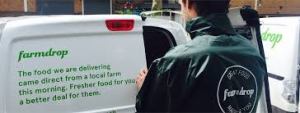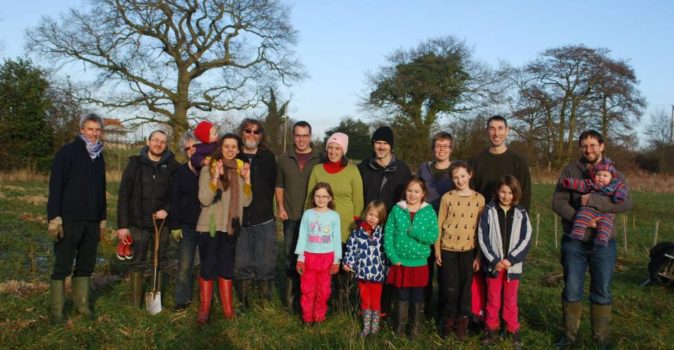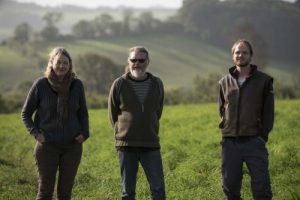I am pleased to share with you my latest article, re-published with kind permission from Sustainable Food Trust, the global voice for sustainable food and health. I added images.
Are city start-ups a help or hindrance to local food?
In the last few decades, there has been a quiet revolution in food as more farmers have increasingly sold their produce direct to the public. By circumventing the supermarket system, farmers are strengthening local food systems, rebuilding connections between people and the source of their food.
This direct sales home delivery model has long been the domain of the Community Supported Agriculture (CSA) movement. However, thanks mainly to online technology, this revolution is ratcheting up a notch with the arrival of a raft of new companies backed by city finance.
HelloFresh, founded in 2011 and now active in seven countries, was valued at around £2 billion in 2015; Gousto, founded in 2012 and backed by Unilever, recently drew an additional £28.5 million from backers; and Farmdrop, founded in 2012, attracted £7 million from investors in 2017 including Skype co-founder, Niklas Zennström.
The question that arises, is whether these new models enhance or weaken sustainable local food systems? On one hand, the idea of encouraging people to cook – from ‘scratch’ using recipe boxes for a fantastic array of meals, with exact ingredients and directions provided – is to be celebrated. On the other hand, could this very choice seduce the public away from supporting their local farmer?
Small-scale farmers are the foundation of a sustainable food system. Organic, biodynamic and other sustainable agriculture systems regenerate soil, support wildlife and produce a variety of fresh local food which increases local and national food security. Selling direct enables farmers to keep their small-scale values – and their profits. By buying directly from a farmer, a food citizen is supporting economic and environmental sustainability.

Pioneered by small-scale organic farmers in the 1980s, the CSA model of direct sales and home delivery by-passes the supermarket system and its pulverising demand for industrial uniformity. The humble veg box has been crucial in establishing a direct connection between shopper and farmer – as well as reducing plastic waste and fuel miles.
The CSA reinforces this bond. Members support the farmer come rain or shine (literally) by paying up front for their share of the harvest. It is not a one-way relationship. A CSA member gets fresh local produce, knows exactly where their food comes from, and has opportunities to volunteer or socialise at the farm.
Adapt to survive

The idea that well-endowed home delivery companies could threaten CSAs is nothing new, according to Maresa Bossano of CSA UK Network.
“Small organic veg box schemes in the UK went through the same thing quite a few years ago when [box schemes] from Abel and Cole and Riverford first came on the scene, mainly because they offered customers more choice and better customer service; in many cases, smaller box schemes couldn’t compete and closed down. Others expanded and changed the way they operated by also providing imported fruit and giving customers the option to choose which produce, not just a set box, like some community-run schemes such as the Community Farm (pictured above).

Biodynamic farmer, Marina O’Connell, of Huxhams Cross Farm. Image: Biodynamic Land Trust
Marina O’Connell (pictured above) who grows and sells produce at 34-acre Huxhams Cross Farm, two miles down the road from big box company Riverford Organic Farmers, has also adapted their CSA offering.
“We offer a regular veg bag home delivery to customers in a 30-mile radius. We do top-up the fruit bag with produce, particularly citrus in the winter. We find that people choose to come to Huxhams Cross Farm because it is small, local, and our produce is really fresh. People come, look around the farm and meet the farmers. And, as a biodynamic farm, this makes a difference to those who want it.”
Marina O’Connell sees the so-called competition as positive: “I think all organic farms – big or small – are good. They all build the market for organic produce, and the more offers there are, the more people will take them up. I think that, as a whole, the large organisations have done a great service for the organic movement.”
National organic box schemes
It could, certainly, be argued that big national schemes encourage sustainable food production. Abel & Cole, founded in 1987 and now owned by William Jackson Food Group, may be a middleman but it sources 95% of its fruit and veg direct from organic growers.
Riverford Organic Farmers, also founded in 1987, has similarly created outlets for organic produce. A family business growing 30% of its produce in Devon, it works with a farmer-owned cooperative of 16 small-to-medium organic farms. From June 2018, Riverford will operate as an employee-owned business, with its founder, Guy Watson retaining only 26% of it.
Organic farmer and campaigner, Guy is aware of the risk posed by Riverford’s wide offerings such as organic Spanish broad beans in spring. “We offer 70% of UK produce round the year but perhaps we should put more pressure on ourselves to offer a more edited content. I would love to sell only UK organic produce. But the mood is towards specifying what is in the box with a bespoke order.”
Millennial-driven
Technology is the driver in this current phase of online food offerings. It is, for instance, creating new ways of selling local food with initiatives such as the not-for-profit Open Food Network, an open source online food distribution system, and The Food Assembly, a cross between a buyer’s group and a farmers’ market.
At the driving wheel are tech-savvy millennials: “We’ve certainly seen all our fresh organic produce grow,” Adam Wakeley of Organic Farm Foods told the Smallholder. “One reason is down to an evolving consumer profile – millennials are now our biggest customer group, and they show a huge interest in food provenance and health. They understand that having food grown in an environmentally friendly way is a good thing. We believe their attitude is here to stay and will continue to drive growth in the future.”
Transparency and fair pay for farmers
Let’s hope the start-ups are listening to the millennials because HelloFresh has a disturbing lack of information on its website. “Our veggie box is bursting with tasty new ingredients and adventurous recipes that will make your taste buds sing.” This slogan makes no reference to provenance or seasonality and tells you nothing about where the produce comes from or how it is produced. Perhaps the real risk to sustainable food is the lack of transparency with marketing messages which may not live up to their promise?
In the online advert bidding wars, HelloFresh and Gousto are positioning themselves as alternatives to the established organic box schemes, Abel & Cole and Riverford. However, apart from featuring Yeo Valley Organic yogurt, I could see no other reference to organic produce on Gousto’s website.
I contacted Gousto, Hello Fresh and Farmdrop about their sourcing policies but only Farmdrop replied. Billed as the ‘ethical grocer’, with hubs in London, Bristol and Bath, there is a lot to like about Farmdrop: its search boxes for organic and pesticide-free; its mobile app (instead of a weekly subscription) which links farmers and customers; and its stated mission to “fix the broken food system”.

Farmdrop also believes in a fair price to farmers. Its policy is to pay local suppliers “at least 70% of the final retail price. The exact amount will vary depending on the producer. Milk suppliers for example usually take a higher margin of around 75%,” says a spokesperson for Farmdrop. According to its website, farmers would be lucky to receive 50% from supermarkets.
A fair price could be the ballast for these city-financed companies, ensuring their financial growth is not at the expense of small-scale organic growers. “There is definitely interest in different ways of buying food, and we expect this trend to grow – online shopping, for example, could make up a quarter of all UK sales of organic products in the next five years,” says Soil Association, head of horticulture, Ben Raskin. “We welcome new models of delivery services – if they do things properly. There is potential for this to bolster the market, but the key is farmers and producers being paid a fair price.”
According to the Soil Association Organic Market Report 2018, alternative models of shopping for organic food are expanding: online shopping sales grew by 9.7% and home delivery (i.e. box schemes and recipe boxes) grew by 9.5%.
CSAs do not need to lose out, if cooperation can be encouraged: ”It would be good to see some of the platforms develop a section for CSAs, perhaps working with the CSA Network UK to help develop this,” says Ben.
CSAs build relationships

Community-supported Bennison Farm. Image: CSA Network UK
Although CSAs may not be able to compete on choice, they continue to flourish, with over 100 CSA farms listed on CSA Network UK and over 15 new ones in 2015-17.
“The new online marketplaces may take business away from some box schemes but,” says Maresa Bossano, “they generally appeal to busy working people who aren’t so confident with cooking. Whereas generally CSA members love cooking and experimenting with vegetables, and to be a member of a CSA, they have enough time to participate in some way.”
As well as appealing to these different kinds of shoppers, the CSA subscription model also protects the farmer, as Danny Steele of Bennison Farm (pictured above. Image: Bennison Farm) in Thorrington near Colchester explains:
“We pack around 115 veg shares per week with produce harvested the same day. The difference for me, is that our members can only get a regular share of our harvest by subscribing; I think I feel less threatened by the big box schemes precisely because we are a CSA.”













